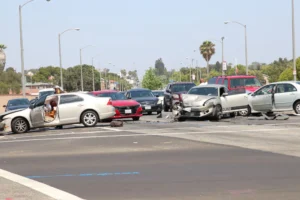Commercial drivers are the backbone of the U.S. economy. Truck drivers work long, tough hours keeping the supply chain moving and helping ensure that goods and products reach their destinations on time, but this critical responsibility does come with stringent regulations. Do CDL drivers get drug tested? Yes. CDL holders are subject to strict drug testing protocols mandated by the Department of Transportation (DOT) to ensure road safety.
For drivers, failing these tests can lead to severe consequences including the loss of their licenses, and therefore their livelihoods. Guzman Law Firm, led by attorney Javier Guzman and his dedicated legal team, works hard to protect CDL holders from complex federal charges, including human smuggling and drug convictions.
If you or a loved one is a truck driver facing criminal charges, call Guzman Law Firm today at (956) 516-7198 to ensure your rights are upheld throughout the legal process.
How often do CDL drivers get drug tested?
CDL drivers undergo drug testing at multiple points during their careers. The DOT mandates several types of tests:
- Pre-employment
- Post-accident
- Reasonable suspicion
- Return-to-duty
- Follow-up tests
Each type serves a specific purpose in maintaining road safety and ensuring that drivers are not impaired while operating large commercial vehicles.
Do truckers get randomly drug tested?
Yes, truckers are subject to random drug testing. The DOT requires that employers of CDL holders conduct random drug tests throughout the year. These tests are unannounced and randomly scheduled to ensure that drivers do not have the opportunity to prepare in advance. They claim that the random selection process is scientifically driven to ensure fairness and impartiality, but this certainly does not always hold true.
Employers must test a minimum percentage of their CDL drivers annually, a rate determined by the DOT and subject to change based on the industry’s overall drug testing results. For drivers, this means staying prepared for a drug test at any time while on duty.
What are the new CDL drug testing requirements?
The landscape of CDL drug testing is continuously evolving; the DOT has implemented several new regulations and testing requirements that holders of a Texas CDL driver’s license must adhere to, reflecting an increased focus on identifying and mitigating substance abuse among commercial drivers:
- Expanded drug testing panel: Initially, the DOT drug tests screened for a standard five-panel set of drugs: marijuana, cocaine, amphetamines, opiates, and phencyclidine (PCP). Recognizing the growing opioid crisis, the DOT expanded this panel to include semi-synthetic opioids such as oxycodone, hydrocodone, oxymorphone, and hydromorphone.
- The DOT Drug and Alcohol Clearinghouse: Established in January 2020, the DOT Drug and Alcohol Clearinghouse is a secure online database that provides real-time access to information about CDL drivers’ drug and alcohol program violations. Employers are required to report any violations, including positive drug test results and refusals to test, to the Clearinghouse.
- Increased random testing rates: The Federal Motor Carrier Safety Administration (FMCSA) has increased the minimum annual random drug testing rate from 25% to 50% of the average number of driver positions. This means that more CDL drivers are subject to random testing each year, making it harder for substance abuse to go undetected.
- Enhanced testing procedures: This includes more stringent protocols for sample collection and handling. For example, urine samples must be collected in a controlled environment, often with a witness present, to prevent any attempts to adulterate or substitute the sample.
Failing a drug test can often be the first step in a long series of disciplinary decisions. At minimum, you can expect removal from your post and increased scrutiny after a failed drug test, but more on that later.
Continue reading: How much pot is a felony?
What does a DOT urine test check for?
A DOT urine test is designed to detect a variety of substances that could impair a driver’s ability to operate a commercial vehicle safely. As mentioned above, the expanded panel now includes:
- Marijuana (THC)
- Cocaine
- Amphetamines (including methamphetamine and MDMA)
- Opiates (including codeine, morphine, and heroin)
- PCP
- Semi-synthetic opioids
The test looks for both the presence of these substances and their metabolites, which can indicate recent use. The urine sample collection process is closely monitored to prevent tampering, and the results are reviewed by a Medical Review Officer (MRO) to ensure accuracy and address any legitimate medical explanations for the test results.
Learn more: Is marijuana a federal crime?
What happens if you fail a DOT drug test?
Failing a DOT drug test triggers a series of actions to remove the driver from safety-sensitive duties immediately. The steps include:
- Immediate removal: The driver is removed from any safety-sensitive functions, which include operating a commercial vehicle.
- Substance Abuse Professional (SAP) evaluation: The driver must undergo an evaluation by a DOT-qualified SAP, who will recommend a course of treatment or education based on the driver’s specific needs.
- Completion of treatment/education program: The driver must complete the recommended program, which could range from a brief educational session to a more extended rehabilitation program, depending on the severity of the substance use issue.
- Return-to-duty test: After completing the program, the driver must pass a return-to-duty drug test to demonstrate that they are free of prohibited substances.
- Follow-up testing: The driver will be subject to unannounced follow-up testing, as determined by the SAP, to ensure continued compliance and abstinence from substance use.
Additionally, a failed drug test is recorded in the DOT Drug and Alcohol Clearinghouse, which can significantly impact a driver’s future employment opportunities. Employers are required to check the Clearinghouse before hiring a new driver and annually for current employees, making it difficult for drivers with a history of drug violations to find work in the industry.
Drug charges threatening your CDL? Let Guzman Law Firm protect your rights.
So, do CDL drivers get drug tested? Yes. And facing a controlled substance charge in Texas can be daunting, especially when your livelihood as a CDL holder is at stake. The consequences of a drug conviction extend beyond legal penalties, potentially leading to the loss of your CDL and the end of your driving career.
Laredo and San Antonio drug crime lawyer Javier Guzman focuses his practice in criminal defense for CDL holders facing drug charges. With a deep understanding of both federal regulations and the nuances of criminal law, Guzman and his legal team are dedicated to protecting your rights and fighting for your best interests.
Guzman Law Firm offers comprehensive legal support, from challenging the validity of the drug test to negotiating plea deals or defending you in court. Their goal is to mitigate the impact of the charges on your career and help you navigate the complex legal landscape. If you find yourself facing drug charges, we stand ready to protect your career and your freedom. Contact us today to learn how we can assist you in your case.
More Helpful Articles by Guzman Law Firm:
- Can You Get a CDL with a Felony in Texas?
- The Difference Between Burglary vs. Robbery in Texas
- What Is Human Smuggling in Texas?
- Truck Drivers Smuggling Drugs in Texas: What You Need to Know
- How To Get a Drug Trafficking Charge Dismissed





